
Elymnias hypermnestra, the common palmfly, is a species of satyrine butterfly found in South and Southeast Asia.

Caleta caleta, the angled Pierrot, is a species of blue butterfly found in Sulawesi.
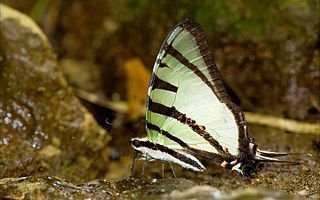
Graphium agetes, the fourbar swordtail, is a widespread species of swallowtail butterfly found in tropical Asia. It is common and not threatened.

Graphium cloanthus, the glassy bluebottle, is a common, non-threatened tropical butterfly of the family Papilionidae.
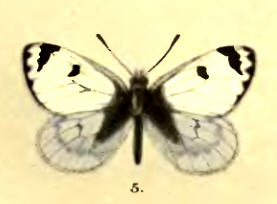
Baltia shawi, the Shaw's dwarf, is a small butterfly of the family Pieridae, that is, the yellows and whites. It is found at high altitudes in Central Asia.
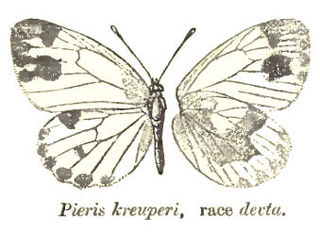
Pieris krueperi devta, the green-banded white, is a small butterfly of the family Pieridae, that is, the yellows and whites. It is found in India and Pakistan. It is a subspecies of Krueper's small white.

Charaxes marmax, the yellow rajah, is a butterfly found in India that belongs to the rajahs and nawabs group, that is, the Charaxinae group of the brush-footed butterflies family.

Miletus symethus, the great brownie, is a small butterfly found in India that belongs to the lycaenids or blues family. The species was first described by Pieter Cramer in 1777.
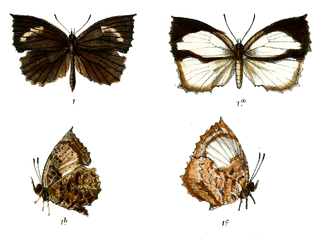
Allotinus drumila, the crenulate darkie, is a small butterfly found in India, Burma, Thailand, Laos, Vietnam, and Yunnan (China) that belongs to the lycaenids or blues family.

Caleta roxus, the straight Pierrot, is a small butterfly that belongs to the lycaenids or blues family. It is found in India and Southeast Asia.
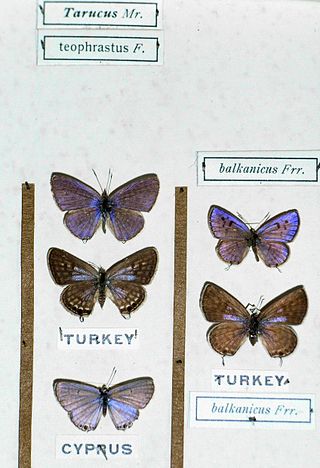
Tarucus theophrastus, the common tiger blue, pointed Pierrot or African Pierrot, is a small butterfly found in the Old World tropics. It belongs to the lycaenids or blues family.

Azanus jesous, the African babul blue or topaz-spotted blue, is a small butterfly found in Africa, Egypt, Syria, India, Sri Lanka and Myanmar that belongs to the lycaenids or blues family.

Hypolimnas misippus, the Danaid eggfly, mimic, or diadem, is a widespread species of nymphalid butterfly. It is well known for polymorphism and mimicry. Males are blackish with distinctive white spots that are fringed in blue. Females are in multiple forms that include male-like forms while others closely resemble the toxic butterflies Danaus chrysippus and Danaus plexippus.

Byblia ilithyia, the spotted joker or joker, is a species of nymphalid butterfly found in parts of Africa and Asia.

Hippotion celerio, the vine hawk-moth or silver-striped hawk-moth, is a moth of the family Sphingidae. It was described by Carl Linnaeus in his 1758 10th edition of Systema Naturae.

Theretra nessus, the yam hawk moth, is a moth of the family Sphingidae. It was described by Dru Drury in 1773.

Erebus macrops, the common owl-moth, is a species of moth of the family Erebidae first described by Carl Linnaeus in 1768. It is found in the subtropical regions of Africa and Asia. The wingspan is about 12 cm, making it exceptionally large for an Erebidae species. The larvae feed on Acacia and Entada species.

Aporandria is a monotypic moth genus in the family Geometridae described by Warren in 1894. Its single species, Aporandria specularia, was first described by Achille Guenée in 1857. It is found in Sri Lanka, India, Vietnam, Thailand, the Andamans, Peninsular Malaysia, Sumatra, Borneo, the Philippines and Sulawesi.
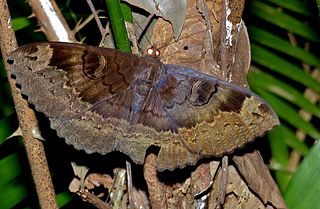
Erebus caprimulgus is a moth of the family Erebidae. It is found from the Oriental Region of India, Sri Lanka, Myanmar to Peninsular Malaysia, Sumatra and Borneo. It also occurs in Taiwan.
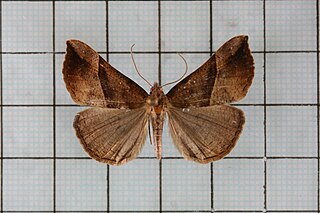
Hypospila bolinoides is a species of moth in the family Erebidae first described by Achille Guenée in 1852. The species is found from the Indo-Australian tropics of India, Sri Lanka, Myanmar, Andaman Islands, China north to Japan and east to New Guinea, Queensland and the Carolines.





















